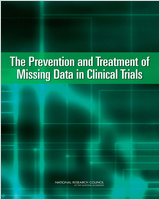NCBI Bookshelf. A service of the National Library of Medicine, National Institutes of Health.
Randomized clinical trials are the primary tool for evaluating new medical interventions. Randomization provides for a fair comparison between treatment and control groups, balancing out, on average, distributions of known and unknown factors among the participants. Unfortunately, these studies often lack a substantial percentage of data. This missing data reduces the benefit provided by the randomization and introduces potential biases in the comparison of the treatment groups.
Missing data can arise for a variety of reasons, including the inability or unwillingness of participants to meet appointments for evaluation. And in some studies, some or all of data collection ceases when participants discontinue study treatment. Existing guidelines for the design and conduct of clinical trials, and the analysis of the resulting data, provide only limited advice on how to handle missing data. Thus, approaches to the analysis of data with an appreciable amount of missing values tend to be ad hoc and variable.
The Prevention and Treatment of Missing Data in Clinical Trials concludes that a more principled approach to design and analysis in the presence of missing data is both needed and possible. Such an approach needs to focus on two critical elements: (1) careful design and conduct to limit the amount and impact of missing data and (2) analysis that makes full use of information on all randomized participants and is based on careful attention to the assumptions about the nature of the missing data underlying estimates of treatment effects. In addition to the highest priority recommendations, the book offers more detailed recommendations on the conduct of clinical trials and techniques for analysis of trial data.
Contents
- THE NATIONAL ACADEMIES
- PANEL ON HANDLING MISSING DATA IN CLINICAL TRIALS
- COMMITTEE ON NATIONAL STATISTICS 2009-2010
- Acknowledgments
- Glossary
- Summary
- 1. Introduction and Background
- 2. Trial Designs to Reduce the Frequency of Missing Data
- 3. Trial Strategies to Reduce the Frequency of Missing Data
- 4. Drawing Inferences from Incomplete Data
- 5. Principles and Methods of Sensitivity Analyses
- 6. Conclusions and Recommendations
- References
- Appendix A Clinical Trials: Overview and Terminology
- Appendix B Biographical Sketches of Panel Members and Staff
This study was supported by contract number HHSF223200810020I, TO #1 between the National Academy of Sciences and the U.S. Food and Drug Administration. Support for the work of the Committee on National Statistics is provided by a consortium of federal agencies through a grant from the National Science Foundation (award number SES-0453930). Any opinions, findings, conclusions, or recommendations expressed in this publication are those of the author(s) and do not necessarily reflect the view of the organizations or agencies that provided support for this project.
Suggested citation:
National Research Council. (2010). The Prevention and Treatment of Missing Data in Clinical Trials. Panel on Handling Missing Data in Clinical Trials. Committee on National Statistics, Division of Behavioral and Social Sciences and Education. Washington, DC: The National Academies Press.
NOTICE: The project that is the subject of this report was approved by the Governing Board of the National Research Council, whose members are drawn from the councils of the National Academy of Sciences, the National Academy of Engineering, and the Institute of Medicine. The members of the committee responsible for the report were chosen for their special competences and with regard for appropriate balance.
- NLM CatalogRelated NLM Catalog Entries
- Review Screening for Cognitive Impairment in Older Adults: An Evidence Update for the U.S. Preventive Services Task Force[ 2013]Review Screening for Cognitive Impairment in Older Adults: An Evidence Update for the U.S. Preventive Services Task ForceLin JS, O'Connor E, Rossom RC, Perdue LA, Burda BU, Thompson M, Eckstrom E. 2013 Nov
- Review Screening for Lipid Disorders in Children and Adolescents[ 2007]Review Screening for Lipid Disorders in Children and AdolescentsHaney EM, Huffman LH, Bougatsos C, Freeman M, Fu R, Steiner RD, Helfand M, Nelson HD. 2007 Jul
- Missing data in clinical trials: from clinical assumptions to statistical analysis using pattern mixture models.[Pharm Stat. 2013]Missing data in clinical trials: from clinical assumptions to statistical analysis using pattern mixture models.Ratitch B, O'Kelly M, Tosiello R. Pharm Stat. 2013 Nov-Dec; 12(6):337-47. Epub 2013 Jan 4.
- Review Primary Care Interventions to Prevent Motor Vehicle Occupant Injuries[ 2007]Review Primary Care Interventions to Prevent Motor Vehicle Occupant InjuriesWilliams S, Whitlock E, Smith P, Edgerton B, Beil T. 2007 Aug
- Trial design and reporting standards for intra-arterial cerebral thrombolysis for acute ischemic stroke.[Stroke. 2003]Trial design and reporting standards for intra-arterial cerebral thrombolysis for acute ischemic stroke.Higashida RT, Furlan AJ, Roberts H, Tomsick T, Connors B, Barr J, Dillon W, Warach S, Broderick J, Tilley B, et al. Stroke. 2003 Aug; 34(8):e109-37. Epub 2003 Jul 17.
- The Prevention and Treatment of Missing Data in Clinical TrialsThe Prevention and Treatment of Missing Data in Clinical Trials
Your browsing activity is empty.
Activity recording is turned off.
See more...
